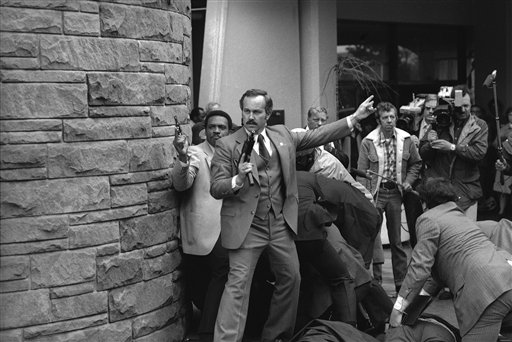In Rankin v. McPherson, 483 U.S. 378 (1987), the Supreme Court ruled that a Texas constable violated the First Amendment rights of a clerical employee when he dismissed her for an intemperate remark she made about President Ronald Reagan during a personal conversation in the workplace.
Government employee argues First Amendment protection for Reagan remark
Constable Walter Rankin terminated employee Ardith McPherson after she admitted telling a co-employee after the John Hinckley Jr. assassination attempt on Reagan, “if they go for him again, I hope they get him.”
McPherson sued in federal court, contending that Rankin violated her First Amendment rights for terminating her for a personal remark on a matter of public concern that did not negatively impact her performance or office functioning. Rankin countered that he had the right to dismiss an employee who made comments so inimical to the functioning of a law enforcement agency.
The case bounced through the lower federal courts twice, as a federal district court dismissed the action only to have the 5th U.S. Circuit Court of Appeals reverse and reinstate the claim. After the 5th Circuit reinstated the suit for a second time in McPherson v. Rankin (1986), Rankin appealed to the Supreme Court.
Court said employee’s speech touched on matter of public concern
The Supreme Court ruled 5-4 in favor of the employee, McPherson, affirming the 5th Circuit.
Writing for the majority, Justice Thurgood Marshall applied the test for public employee speech cases developed in Pickering v. Board of Education (1968) and Connick v. Myers (1983).
The first prong of the Pickering-Connick test is whether the speech touched on a matter of public concern.
Marshall determined that McPherson’s remarks about the president “plainly dealt with a matter of public concern.” He added that “the inappropriate or controversial character of a statement is irrelevant to the question whether it deals with a matter of public concern.”
Government interest in disruptive-free workplace did not trump speech rights
Marshall then applied the balancing prong of Pickering-Connick that asks whether an employer’s interests in an efficient, disruptive-free workplace trump the employee’s free-speech rights.
He struck the balance in favor of McPherson, noting that “there is no evidence that it interfered with the efficient functioning of the office.” He also emphasized that McPherson’s job was clerical and she had “no confidential, policymaking or public contact role.”
Justice Lewis F. Powell Jr. wrote a concurring opinion, believing that it was unnecessary to apply full-blown Pickering-Connick analysis. Powell believed that it was clear that “McPherson’s private speech is protected by the First Amendment.”
Dissenters thought remark did not touch on public concern
Justice Antonin Scalia wrote for the four dissenters, accusing the majority of “irrationally expand[ing] the definition of public concern.” He believed that McPherson’s statement was not on a matter of public concern and that Rankin had every right to discipline McPherson for making such a comment. “It boggles the mind to think that she [McPherson] has such a right,” he opined, adding that it seemed inconceivable that one could “ride with the cops and cheer for the robbers.”
David L. Hudson, Jr. is a law professor at Belmont who publishes widely on First Amendment topics. He is the author of a 12-lecture audio course on the First Amendment entitled Freedom of Speech: Understanding the First Amendment (Now You Know Media, 2018). He also is the author of many First Amendment books, including The First Amendment: Freedom of Speech (Thomson Reuters, 2012) and Freedom of Speech: Documents Decoded (ABC-CLIO, 2017). This article was originally published in 2009.

